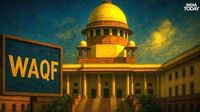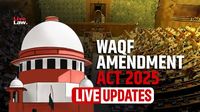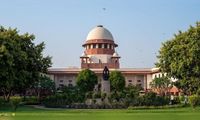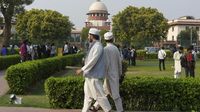On April 16, 2025, the Supreme Court of India indicated it might issue an interim order to halt the denotification of Waqf properties, pending a decision on the constitutionality of the Waqf (Amendment) Act, 2025. This act, which allows designated state officers to determine the legitimacy of claims made by the Waqf Board—responsible for managing religious endowments under Islamic law—has sparked significant controversy.
The court's bench, led by Chief Justice Sanjiv Khanna and comprising Justices K V Vishwanathan and Sanjay Kumar, is set to delve into the implications of the amendments, particularly the provision permitting non-Muslims to serve on Waqf Boards. The hearing is scheduled to continue at 2 PM, where the opposition to this controversial aspect of the law will be a focal point.
During the proceedings, the court raised pointed questions regarding the government's stance. It asked, "Will you allow Muslims to be part of Hindu endowment boards?" This inquiry reflects the broader concerns surrounding the act, which many critics argue undermines the integrity of Islamic practices regarding Waqf properties.
Minority Affairs Minister Kiren Rijiju responded to the criticisms from opposition parties, stating, "Parliament is the will of the people of India. Anything unconstitutional will be looked at by the Supreme Court. But if you keep challenging every law, what will the courts do?" His comments underscore the tension between governmental authority and judicial oversight in matters of religious endowments.
As the Supreme Court prepares for further hearings, the implications of the Waqf Amendment Act continue to resonate. The act was passed by Parliament and ratified by President Droupadi Murmu earlier this month, with a narrow margin of support—128 votes in favor in the Rajya Sabha and a lead of 56 votes in the Lok Sabha.
On April 17, 2025, the Supreme Court will continue to hear pleas challenging the constitutional validity of the Waqf Amendment Act. In a significant development, the court proposed to stay certain provisions of the act, specifically concerning the status of "waqf by user" properties and the presence of non-Muslim members on Waqf Boards.
The Supreme Court's deliberations have highlighted three critical areas of concern: the derecognition of established waqf-by-user properties, the majority presence of non-Muslim members in Waqf Councils, and the disallowance of properties claimed as government land from being classified as Waqf.
Chief Justice Khanna emphasized the historical context, stating, "We cannot rewrite the past. A property declared as waqf some 100 or 200 years ago cannot suddenly be deemed ineligible." This assertion reflects the court's recognition of the long-standing traditions associated with Waqf properties, many of which have historical significance dating back centuries.
During the hearings, the court also expressed concern over the violence that erupted during protests against the Waqf Amendment Act, calling the situation "very disturbing." The Chief Justice remarked, "If the matter is pending here, then such incidents should not happen," indicating the court's commitment to maintaining order during ongoing judicial processes.
In response to the Supreme Court's inquiries, Solicitor General Tushar Mehta assured that the government would not denotify any waqf properties until the next hearing, scheduled for May 5, 2025. This assurance was welcomed by advocates representing the All India Muslim Personal Law Board (AIMPLB), who described the court's interim order as a "very big relief." AIMPLB spokesperson Syed Qasim Rasool Ilyas noted that the court's decisions would prevent the loss of properties previously recognized as waqf.
Meanwhile, AIMIM chief Asaduddin Owaisi reiterated his party's stance against the Waqf Amendment Act, labeling it unconstitutional. He expressed his determination to continue the legal battle against the act, which he believes infringes on the rights of Muslims to manage their religious endowments.
The Supreme Court's decision to segregate petitions filed by Hindu parties challenging earlier Waqf laws from those opposing the 2025 amendments reflects the complexity of the issues at hand. The court has directed that five petitions be treated as lead cases, which will be prioritized in the upcoming hearings.
As public interest in the proceedings grows, the Supreme Court Bar Association (SCBA) has requested live streaming of the hearings to ensure broader access to the proceedings, citing overcrowding in the courtroom during previous sessions. This request underscores the high stakes involved in the case and the significant public interest in the outcome.
West Bengal Chief Minister Mamata Banerjee has also weighed in, accusing the BJP of hypocrisy regarding its treatment of Muslims. She pointed out the contradiction between the party's domestic rhetoric and its acceptance of hospitality from Muslim-majority nations abroad, stating, "You speak against Muslims here, but when you visit Saudi Arabia or the UAE, you gladly accept their hospitality."
As the Supreme Court continues to navigate the complexities of the Waqf Amendment Act, the upcoming hearings are poised to shape the future of religious endowments in India, with implications that extend far beyond the courtroom.
The next hearing is set for May 5, 2025, where the court will further examine the constitutional challenges posed by the Waqf Amendment Act and its potential impact on the management of Waqf properties across the country.







